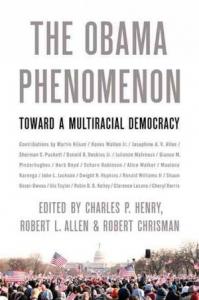Berkeley Books: The Obama Phenomenon: Toward a Multiracial Democracy

After a thoroughly unscientific poll, it has come to my attention that at least three "Where were you when Kennedy was shot?" moments have taken place in my 31-year lifetime: 1) The Challenger Disaster, 2) September 11, 2001, and 3) Barack Obama winning the 2008 presidential election. I watched the Challenger explode in a first grade classroom; I saw the second plane crash into the Towers during my morning Film Theory seminar, and I was holding hands with my best friend at the Rio Hotel and Casino in Las Vegas when John McCain ceded his campaign. Needless to say, all three moments are forever imprinted in my memory as either national tragedies or triumphs.
Obama, as we can recall, burst into national prominence in 2004 when he delivered the keynote at that year's Democratic National Convention. Within a few years, he had uprooted Hillary Clinton's 'inevitable' nomination to be America's first female president, and, mobilizing the banner words "hope" and "change," won 365 (of 538) electoral votes and 52.9% of the popular vote to become the United States' first African American president.
Obama's campaign, electoral victory, and presidency rest at the nexus of any number of deeply rooted anxieties and desires about the history, present, and future of race, power, politics, and ideology. This month's Berkeley Books selection, The Obama Phenomenon: Toward a Multicultural Democracy, a collection of essays edited by Charles P. Henry, H. Michael and Jeanne Williams Chair of African American Studies, Robert L. Allen, adjunct professor of African American studies, and Robert Chrisman, editor-in-chief and publisher of The Black Scholar, deploys many perspectives to illuminate, frame, and grasp what the New York Times famously dubbed "The Obama Phenomenon." The essays in this volume, coming from a multidisciplinary group of preeminent African American politics and culture scholars, tease out the nuances of 2008's galvanizing election and its meaning. Disciplines represented include political science, theology, economics, history, journalism, sociology, cultural studies, and law; topics investigated include the media's variegated relationship to Obama; the public's perception and investments in first lady Michelle Obama, and the history of racial issues in post-60s presidential campaigns.
Robert C. Smith, coauthor of American Politics and the African American Quest for Universal Freedom, writes, "These eminent scholars of African American politics provide rich, multigenerational perspectives on the Obama election and the first year of his presidency."
Visit the Biblio-file to view the books that shaped Henry and Allen's ideas while writing The Obama Phenomenon.